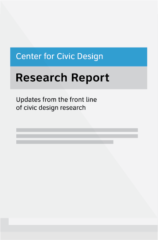New citizens and civic engagement
What works for outreach to communities with low English proficiency and low civics literacy? To learn more, we spoke with new citizens about their experiences voting in the U.S. and participating in civic life more broadly. Our research revealed that there is a wide gap between what immigrants need to learn to pass the civics test at their naturalization interview and what they need to be informed voters. Many factors inform a new citizen’s civic participation, including their overall view of America, their previous experiences with the U.S. government, how financially established they are in the U.S., and their experiences with and views of government from their home country.

What works for outreach to new communities with low English proficiency and low civics literacy
Download reportKey findings
Our research revealed some of the specific barriers new citizens face in participating in American civic life. Overall, participants revealed that acculturation is as important as language access, and this includes levels of civic literacy that natural born citizens don’t think of.
Here are a few key insights:
You have to believe in the idea of the “American dream” to participate in civic life.
The concept of the “American dream” appeared in many of our conversations with new citizens. Some believed in it, some didn’t trust it, and some said you had to buy into the myth when you become a citizen.
Becoming a citizen let some use their political voices.
Freedom to express a political opinion was very special for many of the participants we interviewed. Some became citizens for this reason alone.
“I used to avoid protesting and politics. I was afraid that if I was arrested it could revoke my Green Card. I wanted to be sure I have the rights of a citizen. I wanted to stand in solidarity with others that didn’t have the same privileges.”
Marja (participant)
Positive experiences with government help people feel motivated. Negative experiences do not.
Participants who had good experiences when obtaining their citizenship were motivated to integrate and acculturate. Those who had bad experiences struggled with feeling invited and included.
Enough English for a naturalization interview isn’t enough to take an active part in community and civic life.
Participants said they wanted to listen and watch the news, make friends, and meet their neighbors. But they needed more than basic English. Many of our participants said they needed to focus on work and financial stability before they could make becoming fluent in English a priority.
Participating in civic life and community means different things in different countries.
Concepts like “civic engagement” are not meaningful to immigrants who come from countries where civic and political life are very different from the U.S. When some participants came to the U.S., they brought assumptions with them about whether they were allowed or invited to be involved in political and civic life.
About the research
This research was conducted by CCD alum Christopher Patten and CCD co-founder Dana Chisnell in 2019.
The research methods we used:
- stakeholder interviews
- journey map to visualize the experience of a new citizen after taking the oath
- ethnographic methods to collect stories
- desk research and a literature review to learn about related work that had already been done
Who we spoke with:
- 20 naturalized U.S. citizens
- 3 small group interviews of 5-6 new citizens each
- Hosted storytelling events in Detroit and New York in partnership with community groups to hear new citizens’ stories about what it’s like to be a new American
Related resources
Read the companion report with short stories from new citizens
Visit our page on connecting with new communities to find more resources and research on working with community partners for voter outreach.
The epic journey of the American voter is a resource to help visualize the process every voter goes through and where challenges can arise.

